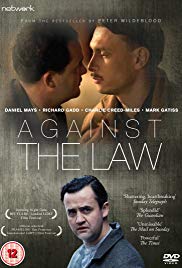
AGAINST THE LAW
UK, 2017, 84 minutes, Colour.
Daniel Mays, Richard Gadd, Mark Gattis, Richard Dillane, Charlie Creed Miles.
Directed by Fergus O' Brien.
This is a brief film made for television focusing on the changes in legislation in the UK concerning homosexuality.
Daniel Mays portrays journalist Peter Wildeblood, the screenplay based on his autobiography. A lonely man, he seeks out male companions at bars, finds an RAF friend with whom he falls in love. For a 21st-century audience, the consequences may be quite surprising and this film is a reminder of the status of homosexuals and any activity, even private and consenting, was considered criminal activity.
The police are shown as being eager to arrest and convict homosexuals, Peter Wildeblood being arrested as well as some upper-class men and being tried in court. The RAF lover gives information about his relationship, especially when letters between the two are discovered, so that he will get a lighter sentence.
The film shows Wildeblood taking advice about defending himself and not admitting the truth – lying during the hearing. He is convicted and goes to jail.
However, there were movements during the mid 1950s especially with the government setting up a committee and getting its findings in the Wolfenden Report, a scene in this film showing Wildeblood giving testimony to the committee.
In fact, after 1957, it was 10 years before the legislation for decriminalisation was passed. And Peter Wildeblood had a continuing career in British television, writing and producing.
1. Issues of homosexuality and the law? In the United Kingdom? Criminal offences? The Wolfenden Report? Changes in the law in 1967? Subsequently?
2. The setting of the 1950s, homes, mansions, pubs, the streets, the courts? Prison? The musical score?
3. The autobiography of Peter Wildeblood? His assertion that he was homosexual? His background as a boy, his identity? In middle age, his work as a journalist? His loneliness, going to the bar, the conversations, the sailors, encountering Eddie, going home, the sexual encounter, the continued contact, the letters? His working for Edward Montague? He and Eddie going to the mansion, the later accusations about orgies? His arrest, the police and their not telling the truth? Out to get him?
4. Peter Wildeblood in court, with Edward Montague and his cousin? The accusations? Peter and his bewilderment? The advice to defend themselves? Not telling the truth? Eddie and his interrogation, the deal, being cross-examined in court, his admissions? Peter and his being cross-examined, his continued lying? The sentence for the three? His going to prison, life in prison, the other prisoners, the camp prisoners, friendships?
5. The interview with the governor, the session with the therapist, the explanations of the therapy, aversion therapy, photos and electric shock, being sick and lying in vomit and excrement for days? The revulsion?
6. Peter going to testify for the Wolfenden Report?
7. Peter, released from prison, going back to his writing? (And his extensive writing and producing career in television?)
8. The glimpse of Edward Montague and his associates, the discussions with Peter about Eddie? Court cases, denials?
9. Eddie, RAF, friendly, Peter thinking he was a bit dim, but enjoying that kind of relaxing friendship? The letters from both and their relationship? Peter never seeing Eddie again?
10. The importance of the testimonials from the men who lived at that time, their own stories, their memories, their stories about the relationships, closeted, coming out, the names? Their all appearing at the end – and the indication of their names and ages? The value of the giving witness and the impact of their stories on the audience?